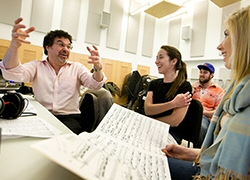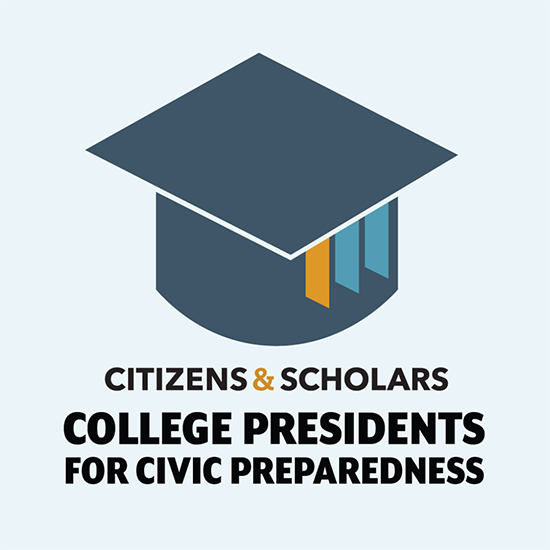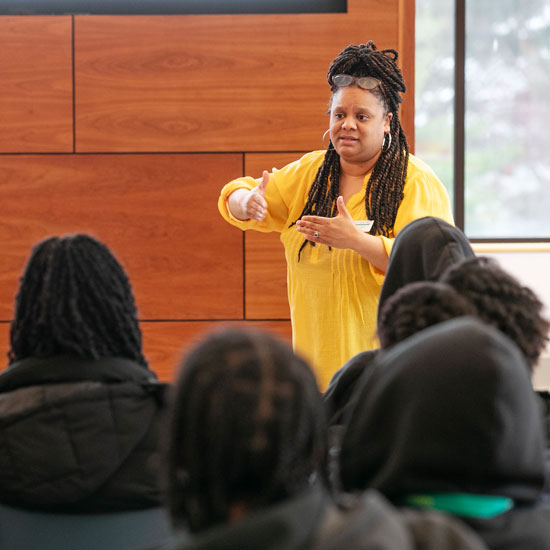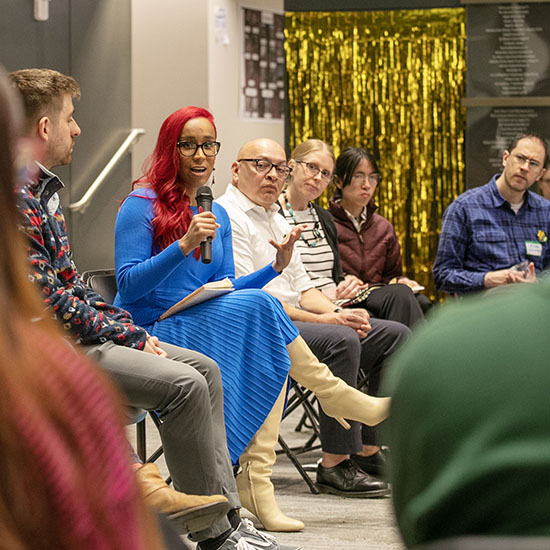Havana orchestra at Zankel
More than one dream came true to bring the Havana Lyceum Orchestra to the Skidmore
stage this month. Acclaimed pianist Simone Dinnerstein joins the orchestra, conducted
by José Antonio Méndez Padrón, on Tuesday, June 20, at 7 p.m. in the Zankel Music
Center. Tickets can be ordered online or at 518-580-5231.
Co-sponsored by Skidmore College and the Saratoga Performing Arts Center, the event
is part of the Mozart in Havana tour, marking the first time a Cuban orchestra of this size has traveled to the U.S. since
the 1959 revolution. The tour coincides with the release of the album Mozart in Havana, produced by Skidmore parent Adam Abeshouse along with David Slitzky '14.

Adam Abeshouse, P '14, '16, working with Skidmore
students in 2012
Praised by the Washington Post as "an artist of true expressive force," Dinnerstein has collaborated with singer-songwriter
Tift Merritt, theremin player Pamelia Kurstin, jazz pianist Brad Mehldau and others.
Her 2007 recording of Bach's Goldberg Variations ranked No. 1 on the U.S. Billboard Classical Chart and was a year's-best pick by the New York Times, Los Angeles Times and New Yorker. She was originally drawn to Cuba by an influential former piano teacher, a native
of the country.
Dinnerstein's former management agency was run by Elizabeth Sobol, now president of
SPAC. Sobol was eager to bring Dinnerstein and the orchestra to town but felt that
SPAC's amphitheater was too big and its Spa Little Theater too small. So knowing that
Skidmore and SPAC partner frequently, she suggested the Zankel's dramatic, 600-seat
concert hall as an ideal venue.
Established only eight years ago, the Havana Lyceum Orchestra has been hailed as "a
central element in Cuba's musical life." Comprising students, recent graduates and
professors from Cuba's University of the Arts, National School of Music and Amadeo
Roldán Conservatory, the group represents the Mozart Lyceum of Havana, an institution
co-sponsored by the Salzburg Mozarteum Foundation in Austria. Padrón, the orchestra's
founding music director, has toured internationally, and his albums have received
Cubadisco prizes. He is also deputy director of the National Symphony Orchestra of
Cuba.

David Slitzky '14
To record Mozart in Havana, Abeshouse and Slitzky traveled to Cuba last year. The
Grammy-winning Abeshouse is the father of Skidmore alumnae Emily '14 and Sarah '16
and has conducted master classes and recorded in the college's Zankel Music Center.
He has been a regular producer for Dinnerstein and says her invitation to join the
Havana project was "the opportunity of a lifetime." He immediately thought of Slitzky,
who engineers at Electric Lady and other studios, to accompany him on the gig.
Slitzky had attended Abeshouse's master classes at Skidmore and considers him a "mentor
and a genius. So when Adam invited me to come with him to Havana, I put everything
else in my life aside and said yes. It was a dream come true. I had been obsessed
with Cuban music since I first heard the Buena Vista Social Club when I was about
10."
Abeshouse packed and shipped his own equipment for the trip. "I had to schlep speakers,
mikes and batteries that weigh 35 pounds apiece," he recalls, because "there could
have been a power brownout, and we would have lost everything." He adds, "I had to
figure out how I could capture the sound, and I had never been in the venue, though
I had seen photographs."
The venue, a reclaimed church, was in downtown Havana, so recording during the day
was impossible—too much street noise. This forced Dinnerstein, the orchestra and the
production crew to work between 10 p.m. and 4 a.m. several nights in a row. During
the day, Abeshouse and Slitzky took long taxi tours to absorb what they could of the
vibrant and exuberant culture, and they found themselves riveted by every aspect of
Havana, from museums to restaurants.
Slitzky says, "I'm a history buff, and I had studied the Cuban revolution. Now, I
have walked those streets that before had existed for me only as a passion." Abeshouse
was fascinated by the extremes he saw in the people and their circumstances. "The
poverty was obvious, stores were empty. But the musicians we worked with were good
to each other, facing hardship together and helping each other through it." Some of
the orchestra members had to travel two hours to get to Havana for rehearsals and
then work through the night, yet he never heard a complaint.
In performance, Abeshouse says, "Simone played beautifully. The orchestra was inspired
by her, and she was inspired by the orchestra. I was struck by how the young performers
were willing to try new things, and especially to play the way Simone asked them to.
You could really hear the orchestra-piano conversation. Also the conductor really
listened to them and helped them to be self-critical in a productive way."
Slitzky was "impressed with the orchestra's interpretation of the music—unique, purely
Cuban, but also worldly and joyful." He says, "This orchestra is unrivaled, despite
their instruments, which are not very good quality." (For the recording, Abeshouse
and Dinnerstein arranged for generous music lovers to lend instruments to the performers.)
"I was in love with the process," Slitzky continues. "I would go through anything
to get back there."
Yet another dream fulfilled by the Mozart in Havana project belongs to Dinnerstein,
for whom it weaves together several meaningful connections: to Cuba, through her beloved
piano teacher; to Sobol as her old agency director; to Abeshouse and their recording
projects; and to Skidmore, where she has enjoyed performing in the past.
As SPAC's Sobol concludes, the Zankel concert partnership is "fantastic culturally,
but it's also personal for so many people. The stars aligned."


